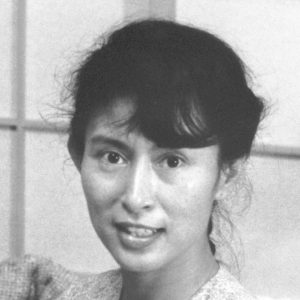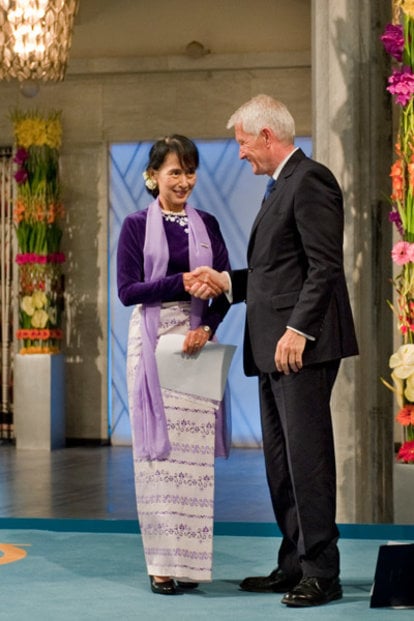Aung San Suu Kyi
Speed read
Aung San Suu Kyi was awarded the Nobel Peace Prize for her non-violent struggle for democracy and human rights in Myanmar.

Full name: Aung San Suu Kyi
Born: 19 June 1945, Rangoon, Burma (now Yangon, Myanmar)
Date awarded: 14 October 1991
Champion of democracy
Aung San Suu Kyi led the opposition to the military dictatorship in her native Myanmar (Burma). In 1988, she was among the founders of the National League for Democracy (NLD). Inspired by Mahatma Gandhi, she renounced all use of violence and called on the generals to turn over their rule to a civilian government. In the 1990 elections, NLD won a clear victory, but the military junta refused to allow the parliament to convene. Aung San Suu Kyi was placed under house arrest. The 1991 Nobel Peace Prize supported Aung San Suu Kyi in her struggle for democracy. It served to protect her and helped keep international focus on the military dictatorship. After 21 years, most of which she spent in house arrest, Aung San Suu Kyi was released in November 2010. On 1 April 2012, she was elected into the Burmese parliament.
”The Norwegian Nobel Committee wishes to honour this woman for her unflagging efforts and to show its support for the many people throughout the world who are striving to attain democracy, human rights and ethnic conciliation by peaceful means.”
The Norwegian Nobel Committee, Prize announcement, Oslo, 14 October 1991.
Her father’s legacy
Aung San Suu Kyi carries on the legacy of her father, Aung San. He led Burma’s struggle for national independence from the United Kingdom in the 1940s and was in the process of drawing up a new constitution when he was assassinated by political opponents in 1947. The large-scale pro-democracy demonstrations in the late 1980s showed that Aung San had not been forgotten.
The struggle for democracy must be fought at home
The Burmese generals would have preferred to have Aung San Suu Kyi living in exile, but she refused to leave the country. The magnitude of her decision became evident when her British husband was diagnosed with advanced cancer. The military regime refused him entry into Burma, offering instead to allow her to travel abroad. She refused their offer for fear that the government would not allow her back into the country. Her continued struggle for freedom in Burma had to take precedence over her wish to see her husband on his deathbed. He died in 1999 at the age of 53.
Two Nobel Prize award ceremonies
Because Aung San Suu Kyi could not attend the award ceremony in 1991, her Nobel Prize medal and diploma were accepted by her two sons. Her elder son, Alexander, gave a brief speech on his mother’s behalf. 21 years later, in June 2012, Aung San Suu Kyi was able to come to Oslo and hold her Nobel Prize lecture: “I am standing here because I was once a prisoner of conscience. As you look at me and listen to me, please remember the often repeated truth that one prisoner of conscience is one too many.”

Copyright © The Nobel Foundation 2012
Photo: Ken Opprann
| Prisoner of conscience A person who is imprisoned for refusing to follow the directives of state authorities for reasons of personal belief, individual conscience. |
Silence over the plight of the Rohingya minority
In 2017, reports of violence by Myanmar’s military forces against civilian Rohingyas sparked worldwide attention and dismay. Ever since, Aung San Suu Kyi has been facing intense scrutiny and criticism over her response to the situation. While recognising that she has limited power over the military, critics underline her responsibility to use her political position and moral authority and publicly distance herself from human rights abuses against the Rohingya minority.
”I am fortunate to be living in an age when the fate of prisoners of conscience anywhere has become the concern of peoples everywhere, an age when democracy and human rights are widely, even if not universally, accepted as the birthright of all.”
Aung San Suu Kyi, Nobel Prize lecture, Oslo, 16 June 2012.
Learn more
1942: September 6. Marriage of Aung San, commander of the Burma Independence Army, and Ma Khin Kyi (becoming Daw Khin Kyi), senior nurse of Rangoon General Hospital, where he had recovered from the rigours of the march into Burma ...
Disclaimer: Every effort has been made by the publisher to credit organisations and individuals with regard to the supply of photographs. Please notify the publishers regarding corrections.
Nobel Prizes and laureates
Six prizes were awarded for achievements that have conferred the greatest benefit to humankind. The 12 laureates' work and discoveries range from proteins' structures and machine learning to fighting for a world free of nuclear weapons.
See them all presented here.
